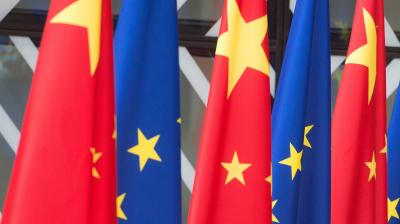EU–China relations at a crossroads, Vol. II
Senior Research Fellow Maaike Okano-Heijmans has contributed the chapter Europe’s strategic dependencies on China: The digital domain to the report EU–China relations at a crossroads, Vol. II, by the EU & China Think-Tank Exchanges project.
About the project
The context of EU–China relations has dramatically changed over the past years. The many opportunities that cooperation with China presents are only one side of the coin. Mounting challenges and diverging perceptions on and approaches to global and domestic affairs risk undermining the effectiveness of the bilateral dialogue. It is crucial to minimise all misperceptions and overcome any lack of understanding in the EU–China bilateral relationship, now more than ever.
The EU & China Think-Tank Exchanges project, coordinated by the European Policy Centre (EPC) with the cooperation of EGMONT–The Royal Institute for International Relations, the China Institute of International Studies (CIIS) and the Center for China and Globalization (CCG), aims to strengthen and stimulate a dialogue between think tanks and research institutes across the EU and China.
Chapter: Europe’s strategic dependencies on China: The digital domain (p.16)
Policymakers in Europe are increasingly concerned with the mounting strain on the existing liberal international order and the shifting geopolitical centre of gravity to the Indo-Pacific, and in particular, China. Technologies play a crucial role herein: the digital revolution is profoundly changing the way in which people live and interact, and technologies are a defining element of the economic and strategic competitiveness of all countries.
This paper highlights paths of action to deal with the main strategic dependencies the EU has in its relationship with China, focusing on the digital and technology domains, within a short- and mediumterm timeframe. A better understanding of Europe’s dependencies and how to address them is sought through an analytical framework that distinguishes between three courses of action, namely: promote, shape & regulate, and protect. These actions are embedded in each layer of the so-called Digital Technology Stack (DTS). The Stack is an established model that unpacks the totality of a country’s technological capabilities, including hardware, software, and services. Adapted to encompass technological and non-technological components, the DTS helps to unveil dependencies in each layer of the Stack, which may be addressed through the promote-shape-and-protect line of action.
This paper is an initial attempt to unveil such dependencies using this comprehensive framework.3 Better comprehension of Europe’s strategic dependencies in all layers of the DTS can contribute to the whole-of-government approach that is needed to tackle the interconnected economic, political and security challenges. After all, the challenges facing the EU and its member states in this era of geopoliticisation of the technological and digital field cannot be solved only by specialists, who tend to have a primarily technical view on sub-sets, whether that is the digital market, the semiconductor business, secure supply of minerals, or internet governance. Avoiding dependencies is about ensuring choice at each layer of the DTS. Improved understanding of this will contribute to better policymaking and greater EU unity, strength, and resilience. All of these are prerequisites to promote Europe’s interests successfully in its relationship with China.






